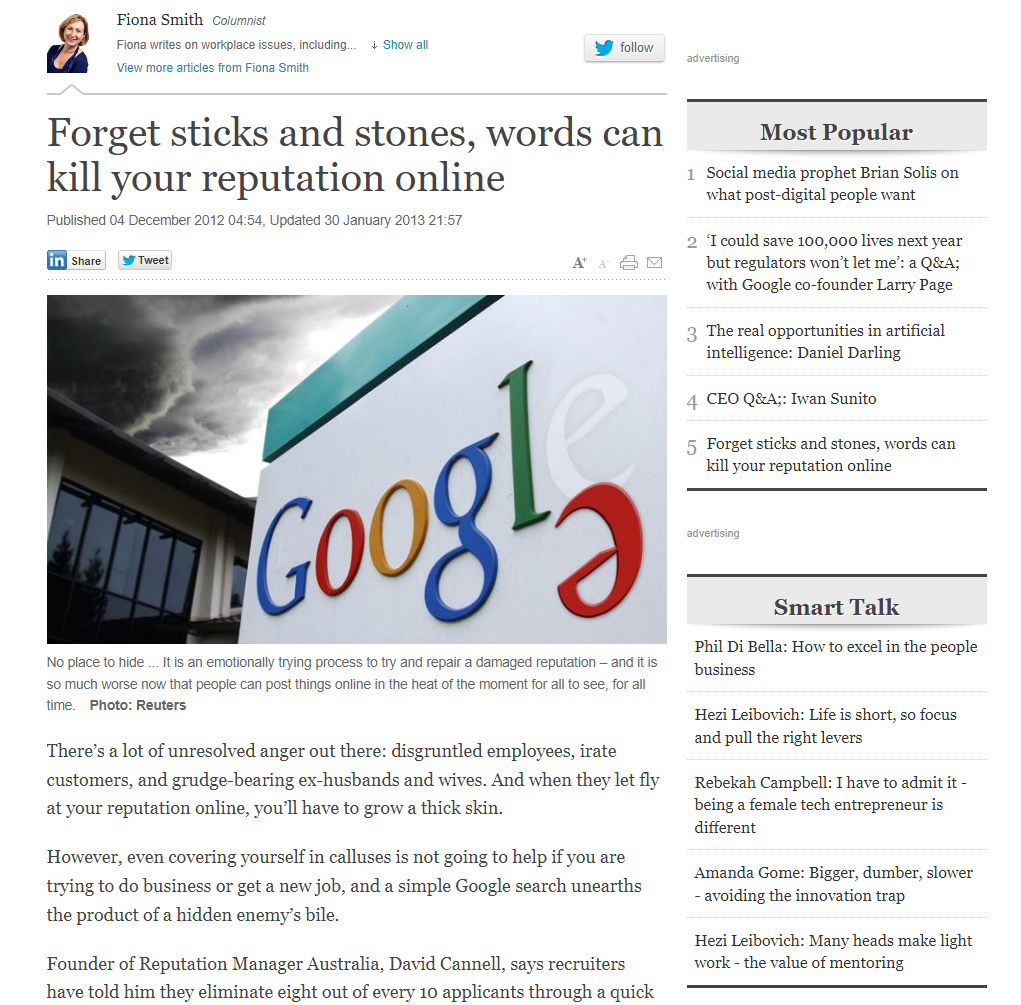Forget sticks and stones, words can kill your reputation online


Read Full Original
Fiona Smith Columnist
Fiona writes on workplace issues,
View more articles from Fiona Smith
Forget sticks and stones, words can kill your reputation online
Published 04 December 2012 04:54, Updated 30 January 2013 21:57
No place to hide … It is an emotionally trying process to try and repair a damaged reputation – and it is so much worse now that people can post things online in the heat of the moment for all to see, for all time. Photo: Reuters
There’s a lot of unresolved anger out there: disgruntled employees, irate customers, and grudge-bearing ex-husbands and wives. And when they let fly at your reputation online, you’ll have to grow a thick skin.
However, even covering yourself in calluses is not going to help if you are trying to do business or get a new job, and a simple Google search unearths the product of a hidden enemy’s bile.
Founder of Reputation Manager Australia, David Cannell, says recruiters have told him they eliminate eight out of every 10 applicants through a quick Google search.
“One of the first places people go is Google,” he says.
To cope with this, Cannell says, calling a lawyer probably isn’t going to give you much relief.
It is certainly worthwhile to try to get defamatory or offensive information taken down on Australian sites, and a legal letter can achieve that. However, if they are based in the US (as are most of the social media networks), you probably won’t even be able to get a response to your request.
“I’m not saying it can’t be done, but you are looking at a very difficult road and it is often very expensive,” he says.
“Google won’t take anything out of the search results, except in extremely rare cases. It would be like opening Pandora’s box for them, they are highly unlikely to do it.”
The good news is that most people don’t look beyond the first page of Google when they are having a snoop. This means that if you can knock an offending reference to your name back a few pages, most people won’t see it.
“More than 97 per cent of people don’t go beyond the first page,” Cannell says. While lawyers may scour through 10 pages of results, recruiters simply don’t have the time or motivation.
Burying bad news sounds simple enough, but it is actually time consuming.
Using new, positive content to overwhelm a negative item is the right idea, but the way Google’s algorithms work means that it must also be relevant (in terms of search engine optimisation) and influential.
It can take months for Cannell’s company to clean up a damaged online reputation by creating this content and it can cost about $1500 a month.
Roger, who has been hounded online by a former employee, has been reasonably successful in ”burying” the snarky comments in blog postings and social media activity. However, one last missive on the first page of a Google search still remains, probably because it was posted on an industry website that ranks more highly in algorithmic terms.
If he can get quoted in a few newspaper websites, that might just be enough to boot it onto the second page – that’s what he has been trying.
Sometimes, the reputational damage is completely unintended, as well as undeserved.
“I’ve just had a call from someone who, over the last couple of years, received some high accolades for what he has done in the industry,” Cannell says.
However, when this man’s name is run through Google, the first page has references to a company he was once associated with that had some compliance issues. Although a deeper search revealed that his involvement in the company was “peripheral”, the initial impression was that he was centrally involved in the company and its problems.
It is an emotionally trying process to try and repair a damaged reputation – and it is so much worse now that people can post things online in the heat of the moment for all to see, for all time. A bit of backstabbing at the pub after work never did nearly as much damage and was often forgotten as the hangover wore off in the morning.
The exhaustive process of managing attacks on an individual’s reputation – or a company’s – is the reason that companies have started to become so proactive when it comes to responding to complaints. It is much cheaper and simpler to pacify even unreasonable complaints than it is to erase the damage later.
Cannell says the service of online reputation management was virtually unheard-of two years ago, but now he gets daily calls from people wanting help. Most individuals, however, baulk at the cost of “cleansing” and Cannell points them instead to online services that give them advice on how to help themselves.
Cannell warns about overseas-based services that offer to sell solutions, saying they generally offer services that deal with US-based websites and are ineffectual on Australian ones.
Read Original Here
